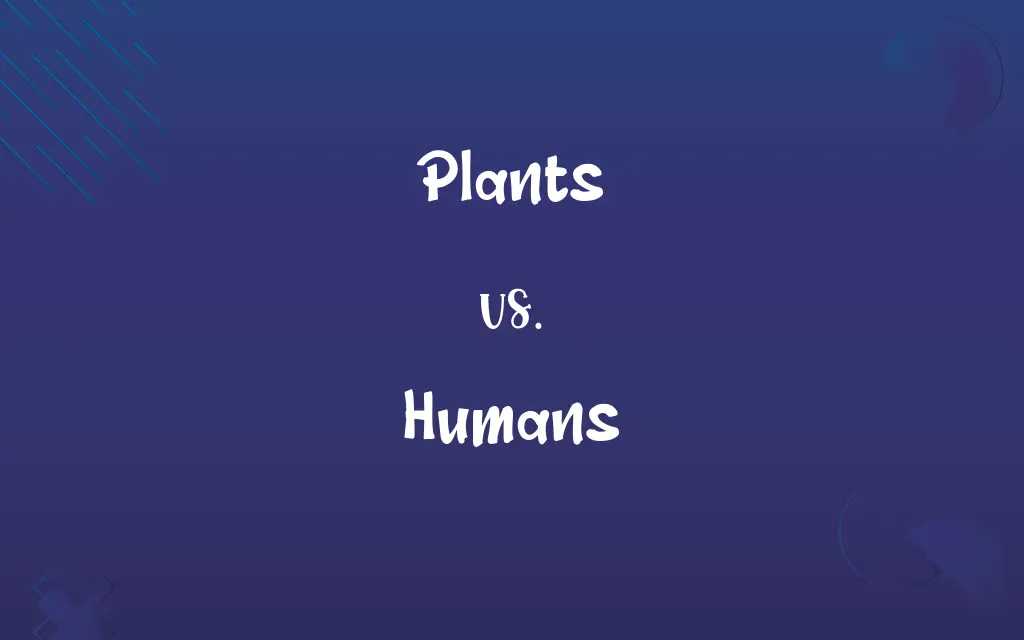Plants vs. Humans: Know the Difference

By Shumaila Saeed || Published on February 8, 2024
Plants are living organisms that primarily perform photosynthesis, while humans are complex, sentient beings with advanced cognitive abilities.

Key Differences
Plants are autotrophic organisms, meaning they produce their own food through photosynthesis, using sunlight, carbon dioxide, and water. Humans, on the other hand, are heterotrophic, relying on consuming other organisms, like plants and animals, for sustenance.
Shumaila Saeed
Feb 08, 2024
Plants typically have a cell structure with rigid cell walls made of cellulose, providing structural support. In contrast, humans have a complex multicellular structure with flexible cell membranes, and a skeletal system for support and mobility.
Shumaila Saeed
Feb 08, 2024
Reproduction in plants can occur both sexually, through pollination, and asexually, via methods like budding or cutting. Human reproduction is exclusively sexual, involving a complex process of fertilization between male and female gametes.
Shumaila Saeed
Feb 08, 2024
Plants do not possess a nervous system or brain, and their responses to stimuli are generally slow and driven by hormonal changes. Humans have a highly developed nervous system and brain, facilitating rapid and complex responses to stimuli, emotions, and thought processes.
Shumaila Saeed
Feb 08, 2024
The lifespan of plants varies greatly, from a few weeks in some annuals to thousands of years in some trees. Humans have a relatively fixed lifespan, with modern averages ranging from 70 to 100 years, depending on geographical and socio-economic factors.
Shumaila Saeed
Feb 08, 2024
ADVERTISEMENT
Comparison Chart
Response System
No nervous system, slow responses
Complex nervous system, rapid responses
Shumaila Saeed
Feb 08, 2024
ADVERTISEMENT
Plants and Humans Definitions
Plants
Organisms with rigid cell walls made of cellulose.
Plants' cell walls provide them with necessary structural support.
Shumaila Saeed
Jan 22, 2024
Humans
Beings known for their advanced cognitive abilities.
The problem-solving skills of humans are exceptionally advanced.
Shumaila Saeed
Jan 22, 2024
Plants
Living entities with a predominantly green pigment, chlorophyll.
The green color of plants is due to chlorophyll.
Shumaila Saeed
Jan 22, 2024
Humans
A species of highly intelligent primates, Homo sapiens.
Humans have developed advanced civilizations and cultures.
Shumaila Saeed
Jan 22, 2024
Plants
Organisms that perform photosynthesis.
The plants in her garden convert sunlight into energy.
Shumaila Saeed
Jan 22, 2024
ADVERTISEMENT
Humans
Species characterized by bipedal locomotion.
Humans are one of the few species that walk upright on two legs.
Shumaila Saeed
Jan 22, 2024
Plants
Entities capable of asexual or sexual reproduction.
Some plants reproduce quickly through asexual means.
Shumaila Saeed
Jan 22, 2024
Humans
Organisms with a complex emotional and social structure.
Humans interact and form societies with complex social norms.
Shumaila Saeed
Jan 22, 2024
Plants
Primary producers in most ecosystems.
Plants form the base of the food chain in their ecosystem.
Shumaila Saeed
Jan 22, 2024
Humans
Creatures capable of manipulating their environment extensively.
Humans have dramatically altered the planet through urbanization and technology.
Shumaila Saeed
Jan 22, 2024
Plants
Any of various photosynthetic, eukaryotic, multicellular organisms of the kingdom Plantae characteristically containing chloroplasts, having cell walls made of cellulose, producing embryos, and lacking the power of locomotion. Plants include trees, bushes, herbs, ferns, mosses, and certain green algae.
Shumaila Saeed
Jan 14, 2024
Humans
A member of the primate genus Homo, especially a member of the species Homo sapiens, distinguished from other apes by a large brain and the capacity for speech.
Shumaila Saeed
Jan 14, 2024
Plants
Any of various fungi, algae, or protists that resemble plants and were formerly classified in the plant kingdom. Not in scientific use.
Shumaila Saeed
Jan 14, 2024
Humans
Of, relating to, or characteristic of humans
The course of human events.
The human race.
Shumaila Saeed
Jan 14, 2024
Plants
A building or group of buildings for the manufacture of a product; a factory
Works in an auto plant.
Shumaila Saeed
Jan 14, 2024
Humans
Having or showing those positive aspects of nature and character regarded as distinguishing humans from other animals
An act of human kindness.
Shumaila Saeed
Jan 14, 2024
Plants
The buildings, fixtures, and equipment, including machinery, tools, and instruments, necessary for an industrial operation or an institution
The university's mechanical plant.
Shumaila Saeed
Jan 14, 2024
Humans
Subject to or indicative of the weaknesses, imperfections, and fragility associated with humans
A mistake that shows he's only human.
Human frailty.
Shumaila Saeed
Jan 14, 2024
Plants
A remark or action in a play or narrative that becomes important later.
Shumaila Saeed
Jan 14, 2024
Humans
All of the inhabitants of the earth;
All the world loves a lover
She always used `humankind' because `mankind' seemed to slight the women
Shumaila Saeed
Jan 14, 2024
Plants
To place (spawn or young fish) in water or an underwater bed for cultivation
Plant oysters.
Shumaila Saeed
Jan 14, 2024
Plants
To place or fix in a certain position
Planted both feet on the ground.
Planted a kiss on my cheek.
Shumaila Saeed
Jan 14, 2024
Plants
To fix firmly in the mind; implant
"The right of revolution is planted in the heart of man" (Clarence Darrow).
Shumaila Saeed
Jan 14, 2024
Plants
To station (a person) for the purpose of functioning in secret, as by observing, spying, or influencing behavior
Detectives were planted all over the store.
Shumaila Saeed
Jan 14, 2024
Plants
To place secretly or deceptively so as to be discovered or made public
Planted a gun on the corpse to make the death look like suicide.
Shumaila Saeed
Jan 14, 2024
Repeatedly Asked Queries
Do both plants and humans need water?
Yes, both require water but in different ways and amounts.
Shumaila Saeed
Feb 08, 2024
Are plants mobile?
Generally, plants are stationary, unlike humans who are highly mobile.
Shumaila Saeed
Feb 08, 2024
Can plants feel pain like humans?
Plants do not feel pain as humans do, due to the lack of a nervous system.
Shumaila Saeed
Feb 08, 2024
Do plants have a brain?
No, plants do not have a brain or a nervous system like humans.
Shumaila Saeed
Feb 08, 2024
Can humans perform photosynthesis?
No, humans cannot perform photosynthesis; they must consume food.
Shumaila Saeed
Feb 08, 2024
Can humans reproduce asexually like some plants?
No, human reproduction is exclusively sexual.
Shumaila Saeed
Feb 08, 2024
Do both plants and humans breathe?
Yes, but in different ways; plants take in carbon dioxide and release oxygen, while humans do the opposite.
Shumaila Saeed
Feb 08, 2024
Are humans considered a part of the natural world, like plants?
Yes, humans are part of the natural world, but their activities and influence often have significant consequences on ecosystems.
Shumaila Saeed
Feb 08, 2024
Are humans dependent on plants?
Yes, humans depend on plants for oxygen, food, and other resources.
Shumaila Saeed
Feb 08, 2024
Do plants have genders like humans?
Some plants have male and female parts, but they don't have genders in the human sense.
Shumaila Saeed
Feb 08, 2024
What role do plants play in ecosystems?
Plants are primary producers that form the basis of food chains, provide oxygen, and help maintain the environment's balance.
Shumaila Saeed
Feb 08, 2024
How do plants and humans differ in terms of nutrition?
Plants produce their own food through photosynthesis, while humans obtain food by consuming plants or other animals.
Shumaila Saeed
Feb 08, 2024
Can humans survive without plants?
No, humans depend on plants for oxygen, food, and various resources, making them essential for human survival.
Shumaila Saeed
Feb 08, 2024
Do plants have a nervous system like humans?
Plants lack a nervous system, and their responses to stimuli are primarily chemical and mechanical, unlike the complex nervous system in humans.
Shumaila Saeed
Feb 08, 2024
What is the main structural difference between plants and humans?
Plants have cell walls, chloroplasts, and a stationary nature, while humans have a complex skeletal and muscular system, as well as a mobile nature.
Shumaila Saeed
Feb 08, 2024
How do humans breathe?
Humans breathe by inhaling oxygen through their nose or mouth and exhaling carbon dioxide, a process known as respiration.
Shumaila Saeed
Feb 08, 2024
What is the human brain responsible for?
The human brain controls various bodily functions, thoughts, emotions, and consciousness.
Shumaila Saeed
Feb 08, 2024
How do humans and plants interact in agriculture?
Humans cultivate plants for food, medicine, and various resources, impacting plant genetics and distribution through selective breeding and farming practices.
Shumaila Saeed
Feb 08, 2024
Do all humans have the same DNA?
While humans share a high percentage of their DNA, there are individual variations in DNA sequences that make each person unique.
Shumaila Saeed
Feb 08, 2024
What role do humans play in ecosystems?
Humans can have both positive and negative impacts on ecosystems, as they can either conserve or disrupt natural balances through their activities.
Shumaila Saeed
Feb 08, 2024
Share this page
Link for your blog / website
HTML
Link to share via messenger
About Author
Written by
Shumaila SaeedShumaila Saeed, an expert content creator with 6 years of experience, specializes in distilling complex topics into easily digestible comparisons, shining a light on the nuances that both inform and educate readers with clarity and accuracy.








































































